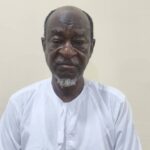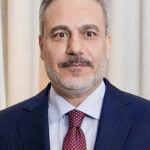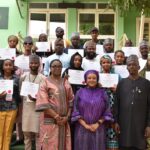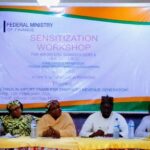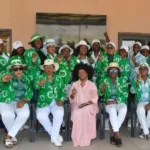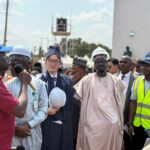By Emmanuel Oloniruha, News Agency of Nigeria (NAN)
Edo, with more than 4 million people, ancient traditions, artifacts and landmarks, remains a vital hub for Nigeria’s cultural heritage, economic growth and political dynamics.
According to the Independent National Electoral Commission (INEC), Edo, at present, has 2,629,025 million registered voters, out of which 2,249,780 million have collected their Permanent Voter Cards (PVCs) to participate in the Saturday governorship election.
Nonetheless, stakeholders have continued to express concerns over the refusal by Peoples Democratic Party’s (PDP) to sign the Peace Accord organised by the National Peace Committee (NPC).
The NPC was set up in 2014 by former Head of State, retired Gen. Abdulsalami Abubakar, the Catholic Bishop of Sokoto, Bishop Matthew Kukah, and other prominent Nigerians, including traditional rulers, bishops and civil society leaders prior to the 2015 general elections.
The key objectives of NPC are to promote peaceful elections, reduce electoral violence, encourage respect for election results, foster non-violent resolution of disputes and enhance national unity and stability.
Political analysts believe that the peace accord, though moral and not legal, relatively contributed to peaceful conduct of 2015 and 2019 general elections, the Edo 2020 governorship election, among others.
They say it also encouraged peaceful resolution of disputes and respect for election results in the country.
In December 2018, the PDP Presidential Candidate, Atiku Abubakar, was not present at the International Conference Centre, Abuja, to sign the peace accord for 2019 general election.
Abubakar, who said that he did not receive the invitation for the programme, went to the Kukah Centre in Abuja to sign the pact on the following day.
In the case of Edo 2024, 17 out of the 18 political parties, including the APC, Labour Party, Accord, Peoples Redemption Party, signed the peace pact on Sept. 12 in Benin City.
Unlike what was witnessed in Dec., 2018, PDP leaders and its Candidate, Dr Asue Ighodalo, boycotted the ceremony over the party’s demands on INEC and the Police ahead of the election.
The party had earlier demanded the redeployment of the Edo Commissioner of Police, Nemo Edwin-Iwo, and INEC Resident Electoral Commissioner (REC) in the state, Dr Anugbum Onuoha.
The PDP also demanded the immediate and unconditional release of its members in Edo, alleged to have been arbitrarily arrested and detained by police.
The PDP acting National Chairman, Umar Damagum, said that the party would not sign the Peace Accord until its conditions were met.
Damagum alleged that the duo were partisan and working for the APC; hence credible election could not be guaranteed in the state under their supervision.
“Nobody is running away from his responsibility; rather we are pointing to Nigerians that there is something cooking by the APC-led administration, under the watch of police who are being paid with tax payers money.
Damagum, however, said that the PDP would participate in the election.
“We will come out in mass and we will defend our votes,’’ he said.
Equally, the PDP Chairman in Edo, Dr Anthony Aziegbemi, accused the REC and CP of having links with the Minister of the Federal Capital Territory (FCT), Nyesom Wike.
Aziegbemi said that the REC in Edo was Wike’s cousin, who served as a Special Adviser on Lands to Wike when he was Rivers Governor.
“Everyone in Nigeria knows the antecedents of Wike and his conduct during elections in Rivers.
“So, we will not close our eyes and watch him deploy the same tactic in Edo.
“The current Edo CP is also a close associate of Wike; we believe he would not act in the best interest of Edo people nor even in the spirit and letters of the Electoral Act,” Aziegbemi said.
Meanwhile, both INEC and the Police have rejected PDP’s demands, stating that the claims by the party were baseless.
Nemi-Iwo dismissed allegations linking his deployment to the state to the influence of Wike, nothing that his deployment to Edo was a routine administrative procedure within the Police Force.
“It is laughable to suggest that the deployment was influenced by the FCT Minister; I don’t have any personal or professional ties with Wike.”
Nemi-Iwo added that as a CP, he was not an electoral umpire.
“As such, I cannot determine the outcome of an election as more senior officers, including two DIGs, AIGs, CPs and other senior officers have been deployed to supervise the conduct of Edo election,’’ he said.
Equally, the Inspector-General of Police, Kayode Egnetokun, reacting to the alleged arbitrary arrest of PDP members in Edo, described it as baseless, saying the police were only determined to unravel the killers of a police officer in the state.
“If you hold the opinion that the I-G is partisan for going after the killer of the policeman, I think you will remain with that opinion forever,” Egbetokun said.
Also rejecting the PDP demand, INEC advised the party to focus on the election process and not on the REC or other officials of the commission.
The Chief Press Secretary to INEC Chairman, Mr Rotimi Oyekanmi, said that the conduct of the election and result collation activity would take place in the open and accredited party agents would witness every step.
“In the same manner, polling unit results will be declared by the respective Presiding Officers (POs) after the voting, ballot sorting and counting processes, in the presence of accredited party agents and other stakeholders.
“The PO will also take a picture of the PU result in each polling unit with the Bimodal Voter Accreditation System (BVAS) and upload same to the INEC Result Viewing portal.
“Thereafter, the various collation stages will be undertaken before the declaration of the final result at the State Collation Centre in Benin-City,’’ he said.
Oyekanmi assured all the political parties, registered voters and other stakeholders that the commission would not give preference to any political party or candidate over the other.
While some stakeholders have touted the development in Edo as a recipe for violence, others have dismissed it, describing it as a non-issue.
The Coalition of United Political Parties (CUPP) said the development in Edo would likely impact the Saturday governorship election in several ways.
The coalition aligned itself with the demand of immediate removal of the REC and the appointment of neutral officials to oversee the election.
To the political group, the credibility of the election process depends on ensuring a level playing field, impartial state actors, and transparency.
Its National Secretary, Chief Peter Ameh, said that the development in Edo would erode trust in the electoral process, leading to voter apathy and disillusionment.
Ameh said it would create an uneven playing field, where one candidate may receive preferential treatment, thereby compromising the fairness of the election.
“Finally, it will undermine the legitimacy of the election outcome, leading to disputes and potentially destabilising the state,’’ he said.
On its part, the Peering Advocacy and Advancement Centre in Africa (PAACA) rejected the narrative and projected PDP’s action as a recipe for violence.
The Executive Director of PAACA, Mr Ezenwa Nwagwu, described it as partisan tactic and an attempt to create an atmosphere of fear, discourage voters from exercising their democratic rights and shift attention from the real issues.
Nwagwu advised voters in Edo to remain confident in the electoral system and not be intimidated by those seeking to suppress turnout.
He said that while the peace accord served as a useful tool for promoting peaceful elections, it was not a substitute for legal processes that guide elections, or the responsibility of security agencies to maintain peace during election.
“Regardless of whether a political party signs the peace accord or not, the duty of the police to enforce the law remains paramount,’’ he said.
The National Chairman of IPAC, Yusuf Dantalle, called on stakeholders in the off-cycle election to work together to create an environment conducive to credible elections.
“I urge all stakeholders to adhere to the principles of democracy, respect the rights of others and prioritise the interests of the Edo people and Nigeria in general,” he said.
Observers say it behooves INEC and police to keep to their oaths of neutrality in the Saturday election.
They hold that all stakeholders, especially political actors, must remember that the peace in Edo, a historic state, is critical to national peace and cohesion.(NANFeatures)
**If used please credit the writer and News Agency of Nigeria.

